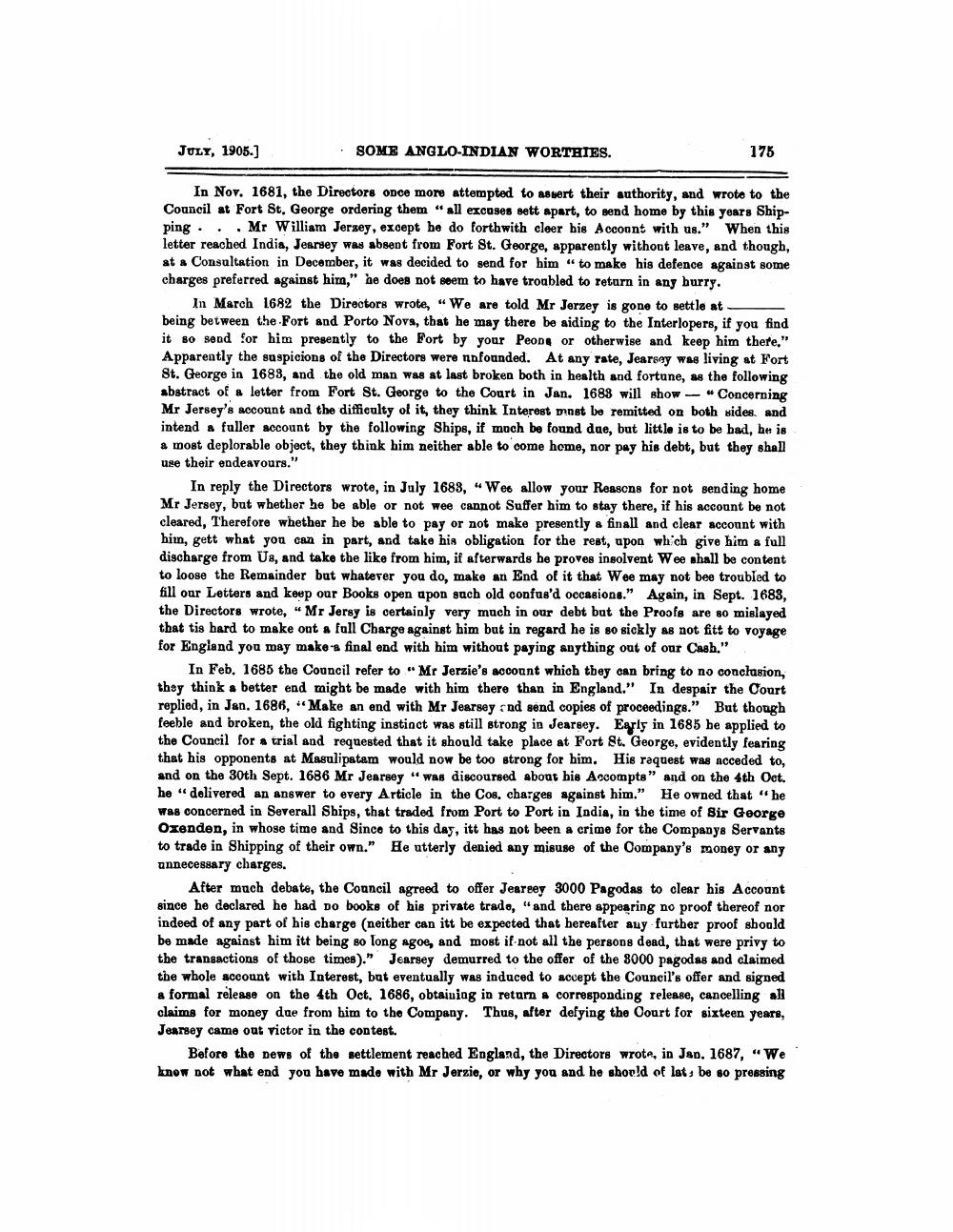________________
JULY, 1905.)
SOME ANGLO-INDIAN WORTHIES.
175
In Nov. 1681, the Directors once more attempted to aswert their authority, and wrote to the Council at Fort St. George ordering them "all excoses sett apart, to send home by this years Shipping ... Mr William Jersey, except he do forthwith cleer bis Account with us." When this letter reached India, Jearsey was absent from Port St. George, apparently without leave, and though, at a Consultation in December, it was decided to send for him to make his defence against some charges preferred against him," he does not seem to have troubled to return in any burry.
In March 1682 the Directors wrote, “We are told Mr Jerzey is gone to settle at being between the Fort and Porto Nove, that he may there be aiding to the Interlopers, if you find it so send for him presently to the Fort by your Peone or otherwise and keep him there." Apparently the suspicions of the Directors were nnfounded. At any rate, Jearsay was living at Fort St. George in 1688, and the old man was at last broken both in health and fortune, as the following abstract of a letter from Fort St. George to the Court in Jan. 1688 will show - "Concerning Mr Jersey's account and the difficulty of it, they think Interest must be remitted on both sides. and intend fuller account by the following Ships, if noch be found dae, but little is to be bad, he is a most deplorable object, they think him neither able to come home, nor pay his debt, but they shall use their endeavours."
In reply the Directors wrote, in July 1688, “We allow your Reasons for not sending home Mr Jersey, but whether he be able or not wee cannot Suffer him to stay there, if his account be not cleared, Therefore whether he be able to pay or not make presently a finall and clear account with him, gett what you can in part, and take his obligation for the rest, upon which give him a full discharge from Us, and take the like from him, if afterwards he proves insolvent Wee shall be content to loose the Remainder but whatever you do, make an End of it that Wee may not bee troubled to fill our Letters and keep our Books open upon such old confus'd occasions." Again, in Sept. 1683, the Directors wrote, “Mr Jersy is certainly very much in our debt but the Proofs are so mislayed that tis hard to make out a full Charge against him but in regard he is so sickly As not fitt to voyage for England you may make a final end with him without paying anything out of our Cash."
In Feb. 1685 the Council refer to Mr Jerzie's account which they can bring to no conclusion, they think a better end might be made with him there than in England." In despair the Court replied, in Jan. 1686, "Make an end with Mr Jearsey and send copies of proceedings." But though feeble and broken, the old fighting instinct was still strong in Jearsey. Early in 1685 be applied to the Council for a trial and requested that it should take place at Fort St. George, evidently fearing that his opponents at Masulipatam would now be too strong for him. His raquest was acceded to, and on the 30th Sept. 1686 Mr Jearsey " was discoursed about bis Ascompts" and on the 4th Oct. he “delivered an answer to every Article in the Cos, charges against him." He owned that he Was concerned in Severall Ships, that traded from Port to Port in India, in the time of Sir George Ozenden, in whose time and Since to this day, itt has not been a crime for the Companys Servants to trade in Shipping of their own." He utterly denied any misuse of the Company's money or any unnecessary charges.
After much debate, the Council agreed to offer Jearsey 3000 Pagodas to clear his Account since he declared he had to books of his private trade, "and there appearing no proof thereof nor indeed of any part of his charge (neither can itt be expected that hereafter any further proof should be made against him itt being so long agoe, and most if not all the persons dead, that were privy to the transactions of those times)." Jearsey demurred to the offer of the 8000 pagodas and claimed the whole account with Interest, but eventually was induced to accept the Council's offer and signed a formal release on the 4th Oct, 1686, obtaining in return a corresponding release, cancelling all claims for money due from him to the Company. Thus, after defying the Court for sixteen years, Joareey came out victor in the contest.
Before the news of the settlement reached England, the Directors wrote, in Jan. 1687, "We know not what end you have made with Mr Jerzie, or why you and he should of lat, be so pressing




